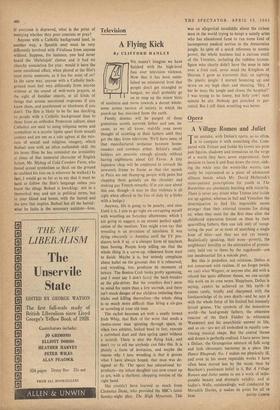Television
A Flying Kick
By CLIFFORD HANLEY
WE mustn't imagine we have finished with the high-level fuss over television violence.
Now that it has been estab- lished on ministerial level that people don't get strangled or some screen version of society in which the punch-up has vanished from the earth.
Family dramas will be purged of those gratuitous scowls between father and son, be- cause, as we all know, real-life sons never thought of scowling at their fathers until they got the idea from television. We'll have none of that manufactured nonsense between home- steaders and cowboys either. Britain's small- holders are neurotic enough already without having nightmares about Gil Favor. A tiny Japanese chap will be employed to retouch the newsreels frame by frame so that riot squads in Paris are not thump:ng people with poles but clapping them genially on the shoulder and making gay French remarks. (I'm not sure about this one, though—it may be that violence is all right when offered in the line of duty by a bloke with a badge.) Anyway, life is going to be peachy, and nice. Until it is, I aim to go right on corrupting myself with wrestling on Saturday afternoons; which I am going to suggest is an almost perfect appli- cation of the medium. You might even say that wrestling is an invention of television. It was dying obscurely in America until the TV pro- ducers took it up As a cheaper form of mayhem than boxing. People keep telling me that the whole thing is a carve-up, rehearsed from start to finish. Maybe it is, but nobody complains about ballet on the grounds that it is rehearsed; and wrestling, too, produces its moments of beauty. The Boston Crab looks pretty agonising, and I must say I don't fancy the back-breaker or the pile-driver. But the wrestlers don't seem to mind for more than a few seconds, and there isn't much danger of our children imitating these tricks and killing themselves—the whole thing is so much more difficult than tiring a six-gun. or scowling at your old man.
The racket becomes art with a neatly turned Irish Whip, that flick of the wrist that sends a twelve-stone man spinning through space, or when two athletes, locked head to feet, execute a cartwheel duet and then spring apart without a scratch. There is also the flying kick, and don't try to tell me anybody can fake this. It is plainly a form of levitation, and maybe the reason why I love wrestling is that it proves what 1 have always hoped, that man was de- signed to fly. The sport has educational by- products—my infant daughter can now count up to ten, with a rhythmic chopping motion of the right hand.
She couldn't have learned as much from Clemence Dane, who provided the BBC's latest Sunday-night play, The High Mountain. This was an allegorical taradiddle about the richest man in the world trying to tempt a saintly artist who has abandoned fame to run some kind of incompetent medical service in the Amazonian jungle. In spite of a quick reference to atomic power, the whole business had a curious smell of the Twenties, including the ruthless tycoon- figure who clearly didn't have the nous to take over a fruit stall, never mind the Kingdom of Heaven. I grew so irreverent that, on sighting the plastic jungle, I started bouncing up and dcwn on my high chair and shouting, 'Hey, I bet he buys the jungle and closes the hospital!' I was trying to be funny, but holy cow! next minute he did. Nobody got punched or gar- rotted. But I still think wrestling was better.


































 Previous page
Previous page